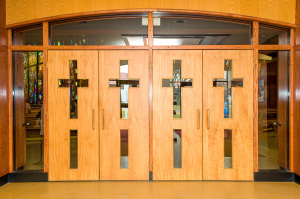New Lawsuits Target States Discriminating Against Religious Schools in Funding Programs

Two federal lawsuits are taking aim at rules in Washington and Maine that critics say unconstitutionally discriminate against religious schools and faith-based organizations when it comes to access to public funding.
In light of the U.S. Supreme Court's ruling last year in favor of a Lutheran church's request for state playground revitalization funding, the educational choice advocacy group Institute for Justice has taken up two cases on opposite ends of the country that center around similar prohibitions against government education grants going to religious institutions.
In Maine, the organization has taken on the case of three families who filed a legal challenge this week against the state's policy of excluding religious schools from the state's school choice program.
As some towns in Maine are too small to warrant their own public high schools, the state gives families in those "tuitioning towns" the money the state would use to educate the children to spend on educating the kids at schools of their choice — whether private or public. However, families are not allowed to use that money to send their children to religious schools.
Aided by the First Liberty Institute in the case, the Institute for Justice argues that such a restriction on religious schools in Maine's tuitioning program flies in the face of the Supreme Court's 2017 ruling in the Trinity Lutheran Church v. Comer case.
In the Trinity Lutheran ruling, the court held that a Missouri rule blocking government funding from going to churches — even for secular purposes like playground advancements for daycare centers — violates the First Amendment of the U.S. Constitution.
"By prohibiting tuition payments for children whose parents choose to send them to sectarian schools, it forces parents to either forgo the benefit of tuition funds for their child or forgo their right to send their child to the school of their choice," the lawsuit filed with the U.S. District Court of Maine states. "Defendant has no compelling, substantial, or even legitimate interest in denying tuition-eligible students and their parents sectarian options while allowing private secular options."
In Washington state, the Institute for Justice has taken on the case of Summit Christian Academy in Spokane and students from Whitworth University. They filed a joint complaint last week over the state's exclusion of religious organizations from a work-study program.
In the Evergreen State, the government operates a program that pays for a portion of a college student's wages while they work part-time jobs that are usually related to their areas of study. While students are allowed to work for public, private, for-profit and nonprofit employers, employers that are sectarian in nature are excluded from the program.
That means that employers like the Summit Christian Academy or any other faith-based entity would not qualify to receive funds as part of the work-study program.
Summit Christian Academy wants to be part of the program so it can have help in paying college students to tutor its students.
"Washington's exclusion of sectarian options from the Work-Study Program is a clear-cut case of religious discrimination," Michael Bindas, a senior attorney with the Institute for Justice, said in a statement. "The U. S. Constitution requires government to be neutral toward religion, not hostile. By denying work-study opportunities to students simply because they desire to work for a religious employer, Washington is running afoul of the First Amendment."
Bindas and fellow Institute for Justice attorney Tim Keller (not to be confused with the popular pastor and author with the same name) wrote a recent op-ed published by The Wall Street Journal explaining the importance of the two cases.
Along with Trinity Lutheran, the attorneys cited the 2002 Supreme Court case of Zelman v. Simmons-Harris, which was also litigated by the Institute for Justice.
"[T]he justices held that school-voucher programs that include religious options don't violate the Constitution," the attorneys wrote. "The decision established a simple test for determining whether such programs are permissible: The government must remain neutral with regard to religion — neither favoring nor disfavoring it — and the participants must exercise a genuine choice between religious and nonreligious options."
The lawyers noted that there are a number of states in the U.S. that have instituted rules similar to what is called the "Blaine Amendment," named after Republican Maine Sen. James G. Blaine, who introduced a failed amendment to the U.S. Constitution in the 1800s that would have prohibited government funding for so-called "sectarian" schools.
Although the amendment failed to pass at the federal level, more than two-thirds of states have passed similar amendments to their state constitutions.
"Although Maine never incorporated such language into its constitution, the decision to ban religious schools from the education program accomplished a similar result," Bindas and Keller wrote. "Washington's constitution does contain Blaine language, and it is the reason cited by the government for excluding sectarian employers from its work-study program."
"The Supreme Court has made clear that Blaine Amendments and other discriminatory government regulations don't square with the First Amendment," the op-ed concludes. "It is time for federal courts to follow Zelman and Trinity Lutheran and give families across the country the full freedom of choice that is their right."





























